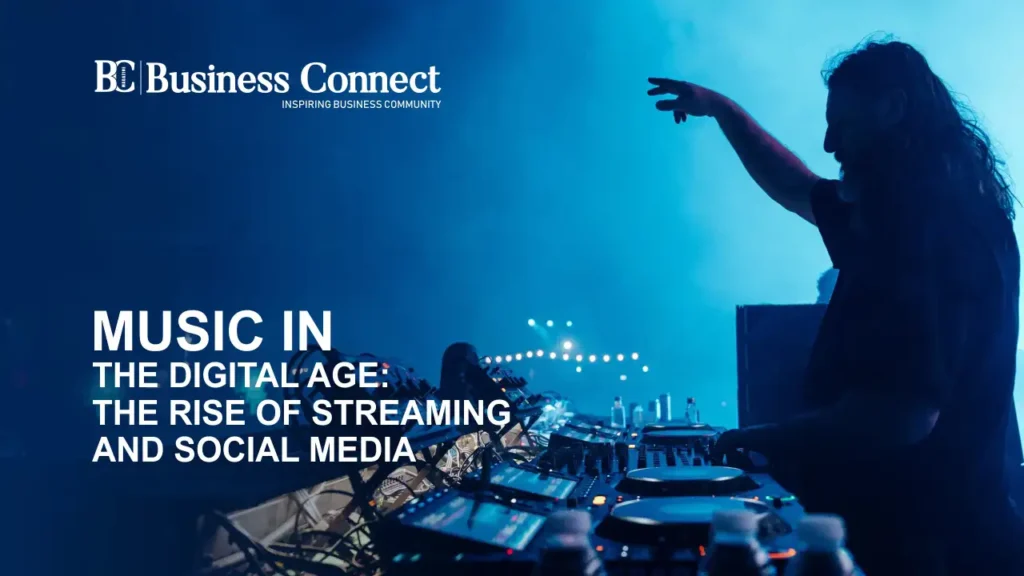Music in the digital age: The rise of streaming and social media
Music industry has undergone a major transformation particularly in the last two decades. In the transformation of music industry, the digital platforms have played a massive role. The technological advancement has completely changed the way in which a music is created, distributed and consumed. Nowadays music is not simply limited to any physical form of media rather it has gained a dynamic interconnected digital ecosystem. This transformation in the music industry has brought unlimited opportunities for both the artists and listeners and are shaping the music industry.
There are various platforms such as YouTube music, Spotify, Saavan, JioMusic, Apple Music which have changed the way people access music. Earlier people had to purchase music albums and CDs or they have to download the music. But with the rise of streaming and social media platforms, millions of tracks are accessible offering variety and convenience on unmatchable scale.
In the digital world, streaming has democratized the way music is being consumed. A modest monthly fee and subscription is being charged which gives users the opportunity to explore a vast library of music of different genres. Due to streaming, various smaller and independent artists can reach to the global audiences and break the monopoly of major record labels. There are several platforms like band camp and SoundCloud which empower these artists by offering tools so that they can distribute their music directly to fans without intermediaries.
The reliance on data is another hallmark of streaming platforms. Algorithms in social media platforms analyses the behaviour of a user such as listening habits, likes and skips and hence offer you some personalized recommendations. You must be acquainted with platforms available on various platforms which introduces us to new artists and tracks which we might have not encountered otherwise. The personalization of such apps enhances the user experiences along with serving as a powerful promotional tool for emerging artists.
Apart from its advantages, streaming faces some challenges. various artists often receive few fractions of cent per stream which makes it difficult for artist on a sustainable income entirely from the streaming revenue. This model favours high volume streaming which creates a disparity between chart topping artist and independent musicians. It has led to calls from more equitable revenue sharing models within the industry along with the call of reform.
The streaming platforms have redefined the way music is being consumed, social media has helped to revolutionized the way music is being discovered and promoted in the market. Nowadays there are various platforms such as Instagram, Twitter and Facebook which have helped the artist to connect with their audiences and build their brands. These social media platforms allow artists to directly engage with their fans by fostering a sense of community and loyalty. Artists can give their fans an intimate look into the life of their favourite musicians through live streaming, behind the scenes content and interactive post. It helps to strengthen the fan relationships and provides valuable feedback which can influence the creative direction of an artist.
Social media presence is quite crucial for the promotion of music as it serves as a platform for self-expression, storytelling and branding. Through creative campaigns, collaborations with influencers and user generated content, artists can amplify their brand reach and visibility. The social media mattresses also play a crucial role in attracting record labels, sponsors and collaborators.
The modern age has completely revolutionized the way music is consumed and promoted. With the advancement in technology, the music production has become more accessible and blurs the line between amateur and professional creators. There are various softwares which has democratized music production. The aspiring musicians no longer need access to expensive studios to create high quality tracks. It has given rise to a DIY culture where independent artists can produce and distribute their music without any traditional industry support. Internet has facilitated these artists with global collaboration. This across the country can work together and share their ideas and tracks through various platforms.
Challenges in Music Industry in the digital age
That is to tell each has unlocked immense potential but it has introduced challenges. some of them are listed below: –
- Due to digital distribution of music, it has become prone to copyright and piracy issues. Unauthorized sharing and downloading still continue to bring significant challenges.
- Millions of tracks are available in the online platform and standing out has become quite difficult. due to abundance of content, it will become quite overwhelming for the listeners and we will put challenges for the artist.
- The pressure of maintaining a constant online presence can bring mental health issues which might lead to stress, anxiety.
Conclusion
The digital age has completely transformed music industry in profound ways. It has brought both opportunities as well as challenges. The fusion of creativity along with technology will redefine music in a newer way. We should shift our focus towards enhancing the quality of experiences rather than expanding access.
Add Business Connect magazine to your Google News feed
Must Read:-
- Top 10 Adorable Gifts for Your Special One
- Top 10 Countries with Maximum Indian Population as Citizens
- Top 10 highest-paid CEO in the World
- Top 10 richest person of India
- Top 10 Highest-Paid CEOs of India



